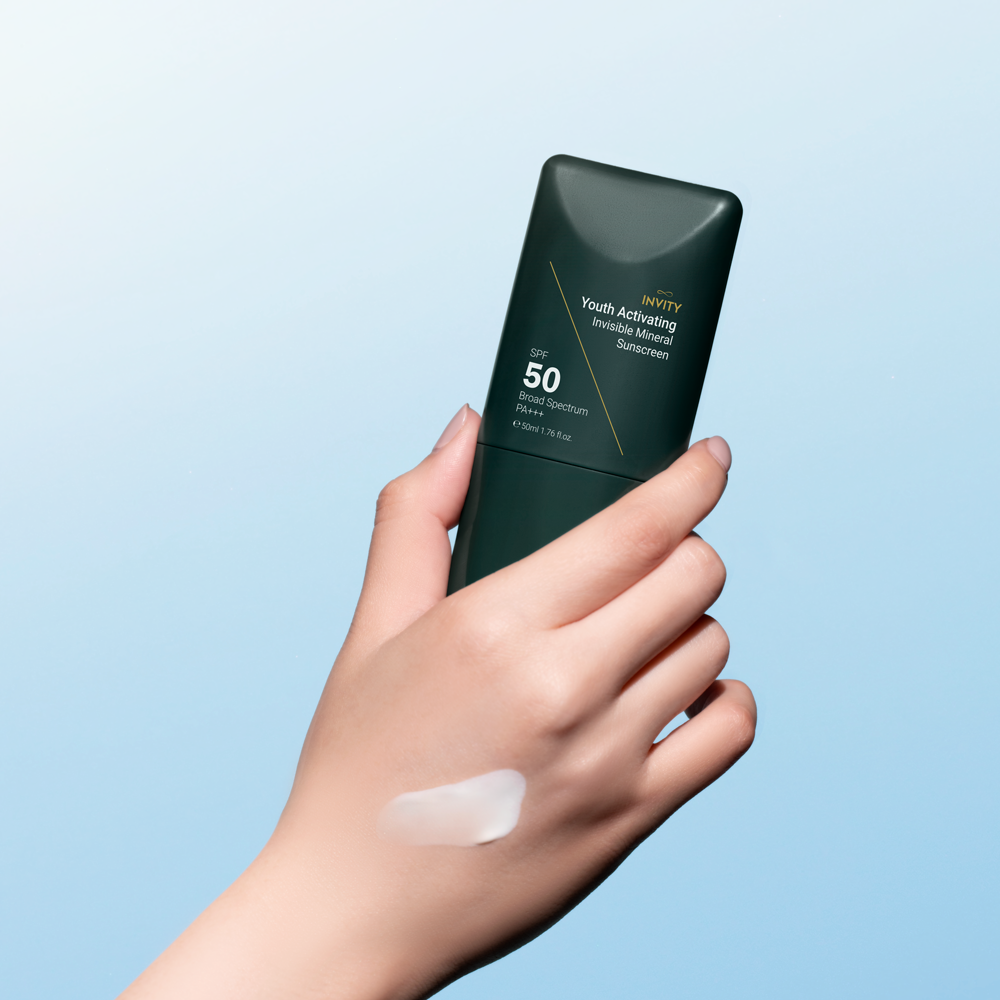The Sun and Your Skin – The Truth About Sunscreens
Posted by Invity on 24th May 2023

Simple fact – when it comes to your skin, the sun is not your friend! That’s the reason why sun protection is your first line of defence against skin ageing and health.
And one of your main allies in this fight is sunscreen. But, for some time, there’s been some concern about sunscreen not only for its impact on the marine environment, but also for our health.
The simple truth is that we need to use sunscreen. It’s an essential part of our sun protection routine, helping to protect the skin from the damaging effects of UV radiation. However, not all sunscreens are created equal.
Let’s find out why you need it and what to look out for when you’re shopping for a good skin defender.
Why Use Sunscreen?
Firstly, sunscreen is your shield against harmful UV rays that can cause damage to your skin cell structures and their DNA, sunburn, and even skin cancer. Our great story UVA and UVB: Reconsider Sun Protection with Invity is a must-read!
So applying sunscreen is like wearing a superhero suit over your skin. If you're not using it, you're putting your skin at risk.
Speaking of cancer, did you know that regular use of sunscreen has been proven to reduce the risk of skin cancer, including the deadliest form, melanoma? That's right, by simply incorporating sunscreen into your daily routine, you could potentially save yourself from a life-threatening illness.
And let's not forget about sunburns, which not only hurt but can also cause long-term skin damage. Sunscreen reduces the risk of sunburn, allowing you to enjoy outdoor activities without worrying about harming your skin. But that’s not all…
Sun exposure can cause premature ageing:
- Those wrinkles, fine lines, and age spots you’re dreading? That’s mostly down to sun damage. And, yes, sunscreen can help prevent this, keeping your skin looking youthful and radiant.
- Uneven skin tone, including dark spots and hyperpigmentation, are also caused by UV damage. Sunscreen can prevent this, keeping your skin looking smooth and even.
- Added bonus! Sunscreen can also protect your skin from environmental pollutants that can cause skin damage.
But! It’s all about choosing the right sunscreen
Now that you know about the amazing benefits of sunscreen, you need to understand the different types of sunscreen and why your choice of sunscreen matters.
Chemical or Mineral-Based Sunscreens – The Pros and Cons
There are two main types of sunscreens: chemical and mineral-based. Each type has its own set of pros and cons. It’s important to consider the potential benefits and drawbacks of each type to ensure that you are making the best choice for your skin and the environment:
Chemical sunscreens
How they work: They penetrate the skin’s surface and absorb UV radiation, converting it into heat that is then released from the skin.
Different chemical sunscreen ingredients offer protection against UVA and UVB rays, so they are often combined to offer the user broad-spectrum protection against both UVA and UVB rays.
The pros: Chemical sunscreens are popular among many people because they offer a lightweight, easy-to-apply option for sun protection.
The cons: There are some potential drawbacks to chemical sunscreens.
- Some people may experience skin irritation or allergic reactions to the chemicals found in these products.
- Some chemical sunscreens can be absorbed into the skin and potentially enter the bloodstream, raising concerns about potential long-term health effects.
- Finally, certain chemical sunscreens have been found to be harmful to marine life, causing damage to coral reefs and other marine ecosystems. But cosmetics scientists have been working hard to develop marine friendly alternatives.
Mineral-based sunscreens
How they work: Mineral-based sunscreens, such as zinc oxide and titanium dioxide, provide protection by creating a physical barrier on top of the skin that reflects and blocks UV radiation.
The pros: These sunscreens are generally considered safe for sensitive skin and are less likely to cause skin irritation or allergic reactions.
Mineral-based sunscreens are also eco-friendly and do not contain harmful chemicals that can harm marine life.
The cons: These are mostly about texture.
- Mineral-based sunscreens can be thicker and more difficult to apply evenly than chemical sunscreens.
- They can also leave a white or chalky residue on the skin, which may not be desirable for some people.
- Also important to know, mineral-based sunscreens may not provide as much protection against UVA rays as some chemical sunscreens.
So how do you choose between chemical and mineral sunscreen?
The choice ultimately comes down to personal preference, skin type, level of protection desired, and your environmental commitment.
The ideal solution is a sunscreen that is safe, effective, and gentle on your skin, and which incorporates the benefits of both chemical and mineral-based sunscreens while avoiding their negative effects. This way, you can enjoy the best of both worlds and protect your skin from harmful UV rays.
The Sunscreen of Choice
Our Youth Activating Invisible Mineral Sunscreen SPF 50 PA+++ provides the best of all worlds, offering broad-spectrum protection against harmful UV rays while also being delicate enough for even the most sensitive skin.
What makes it so special?
We’ve worked hard to give it a weightless, fluid texture that feels like a luxurious chemical sunscreen. The good news is that it is made entirely of natural minerals.
This means it is less likely to clog up pores, compared to chemical sunscreens.
Because it doesn’t penetrate the skin, it is suitable for all skin types, including sensitive, and it won’t cause irritation or other potential health issues mentioned above.
Unlike other mineral-based sunscreens, it leaves no white residue.
Important sun protection tips
Remember that sun protection isn’t only about using sunscreen.
Practice ‘safe sun’ by:
- Avoiding the sun between 11am and 3pm in summer, when UV exposure is at its highest
- Seeking shade when outdoors
- Wearing protective hats and clothing in tightly woven fabrics, as well as UV-protective sunglasses
- Reapplying sunscreen regularly if you perspire heavily, swim or shower
Enjoy!
